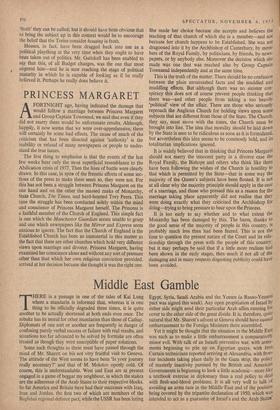PRINCESS MARGARET
AFORTNIGHT ago, having indicated the damage that would follow a marriage between Princess Margaret and Group Captain Townsend, we said that even if they did not marry there would be unfortunate results. Although, happily, it now seems that we were over-apprehensive, there will certainly be some bad effects. The cause of much of the criticism that has been directed against 'authority' is the inability or refusal of many newspapers or people to under- stand the true issues.
The first thing to emphasise is that the events of the last few weeks bear only the most superficial resemblance to the Abdication crisis of 1937. Then the lines of battle were clearly drawn. In this case, in spite of the frenetic efforts of some sec- tions of the press to make them seem so, they were not. For this has not been a struggle between Princess Margaret on the one hand and on the other the massed ranks of Monarchy, State Church, The Times, and hard-hearted Tory Peers. This time the struggle has been conducted solely within the mind and conscience of Princess Margaret herself. The Princess is a faithful member of the Church of England. This simple fact is one which the Manchester Guardian seems unable to grasp and one which newspapers like the Mirror and Express seem anxious to ignore. The fact that the Church of England is the Established Church has been as immaterial in this matter as the fact that there are other churches which hold very different views upon marriage and divorce. Princess Margaret, having examined her conscience alone and without any sort of pressure other than that which her own religious conviction provided, arrived at her decision because she thought it was the right one. She made her choice because she accepts and believes the teaching of that church of which she is a member—and not because her church happens to be Established. She was not dragooned into it by the Archbishop of Canterbury, by mem- bers of the Royal Family, by politicians, by friends, by news- papers, or by anybody else. Moreover the decision which she made was one that was reached also by Group Captain Townsend independently and at the same time.
This is the truth of the matter. There should be no confusion between the plain unvarnished facts and the muddled and muddling effects. But although there was no sinister con- spiracy this does not of course prevent people thinking that there was—and other people from taking a too heavily 'political' view of the affair. There are those who seriously reproach the Anglican Church for holding views upon some subjects that are different from those of the State. The Church. they say, must move with the times, the Church must be brought into line. The idea that morality should be laid down by the State is seen to be ridiculous as soon as it is formulated, but aevertheless this idea seems to be commonly held, and its totalitarian implications ignored.
It is widely believed that in thinking that Princess Margaret should not marry the innocent party in a divorce case the Royal Family, the Bishops and others who think like them have been following the wishes of the Church in hostility to that which is permitted by the State—that in some way the majority of the Queen's subjects have been flouted. It is not at all clear why the majority principle should apply in the case of a marriage, and those who pressed this as a reason for the marriage taking place apparently did not realise that they were doing exactly what they criticised the Archbishop for doing—trying to bring pressure to bear upon the Princess.
It is too early to say whether and to what extent the Monarchy has been damaged by this. The harm, thanks to the good sense of the majority of people in this country, is probably much less than had been feared. This is not the time to question the present nature of the Court and its rela- tionship through the press with the people of this country: but it may perhaps be said that if a little more realism had been shown in the early stages, then 'much if not all of the damaging and in many respects disgusting publicity could have been avoided.










































 Previous page
Previous page